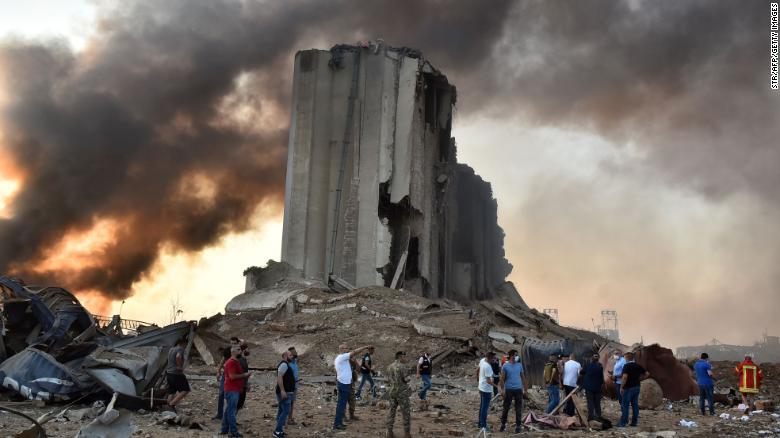
London (CNN) – Clocks stopped when one of the largest non-nuclear explosions in history ripped through Beirut. Inside wrecked homes and shops, the force of the shockwaves froze the dials of timepieces, some vintage, others sleek and modern.
It was 6:07 pm. Thousands of lives were upended and the Lebanese capital — no stranger to disaster — was transformed into a hellscape.
Much like the broken clocks, the catastrophe appears to have been suspended in time. Thursday marks two years since the port explosion. Yet the city’s hardest hit, eastern neighborhoods still bear the scars of the blast. The relatives of at least 215 people who perished still rally for justice. The judicial investigation into the explosion is moribund. And the port’s hulking wheat silos — which withstood the effects of the blast despite their proximity — have been burning for weeks.
In the two years since the explosion, Lebanon’s political elite — known colloquially by the pejorative term al-sulta, or “the power” — has evaded justice and tried to sweep the memory under the proverbial rug. For activists, especially relatives of the deceased, it was painfully reminiscent of the way in which the country’s civil war ended in 1990.
Then, an amnesty law absolved Lebanon’s warring parties of apparent crimes against humanity and war crimes, including massacres, rapes, extrajudicial executions and mass displacement. Accounts of the 15-year conflict are nowhere to be found in the country’s official history books. An entire population was instructed to move on.
The authorities’ playbook has been similar in its response to the 2020 port blast, which remains the single most deadly explosion in Lebanon’s modern history, causing material and physical casualties as far as 12 kilometers (7.5 miles) away.
In the intervening years, the government has repeatedly blocked a judicial probe that charged several officials with criminal neglect over the improper storage of up to 2,700 tons of explosive ammonium nitrate, the ignition of which led to the devastating blast. Some of those who were charged were re-elected to parliament this year.
Earlier this year, the government also rolled out plans to demolish the damaged silos, drawing the ire of the victims’ families, who regard them as a memorial to the disaster. The government bowed to popular pressure and the plan was dropped.
But weeks later, the structure began to burn, arousing the suspicion of activists and relatives of the deceased. They accused the government of making half-hearted attempts to put out the fires — a charge it denies. When two of the silos finally collapsed over the weekend, activists seethed.
“For weeks you let the silos slowly burn and took no serious action to stop the fire,” activist Lucien Bourjeily tweeted, apparently addressing the political establishment. “The collapse (of the silos) today resembles the collapse of the state which is slowly falling apart, with no serious action to stop this nor hold those responsible accountable.”
Beirut’s wheat silos are many things at once. They stand as a towering tombstone to a bygone era. The smoldering structure also seems to fester like the open wound of the city’s collective memory. And importantly to relatives of the victims, it marks the scene of a crime, a looming mass that serves as a reminder of the quest for accountability.
Since the explosion, Lebanon’s financial tailspin, which began in October 2019, has continued. The country is in the throes of a bread crisis, in part because of the fallout from Russia’s invasion of Ukraine, but also due to Lebanon’s infrastructural and financial decay. Its economic woes — inflation, ballooning unemployment, mass poverty — continue unabated.
But for many, the successive crises have not overshadowed the memories of the Beirut port blast: the shattered glass that crunched underfoot for weeks afterward; the scenes of overflowing hospital wards; those who perished and those who barely survived. For those seeking justice, the events of 6:07 pm on August 4, 2020 must continue to reverberate until the people responsible are held to account.



